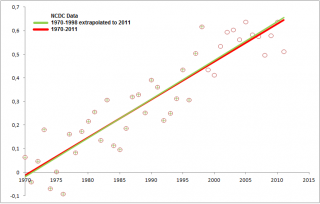batvette
Critical Thinker
- Joined
- Dec 11, 2012
- Messages
- 470
This thread is a continuation of the original Global Warming discussion. That thread may be found here. Thank you.
Replying to this modbox in thread will be off topic Posted By: Loss Leader
But if average global temperatures rose whilst one particular factor was producing a negative forcing it's safe to conclude that that particular factor was not a contributor to that particular period of warming.
You're completely wrong in claiming that there was a negative forcing from the solar factor. Why are you assuming that when its output was still greater than its average over the previous 400 years?
Wouldn't the sun have had to have LESS output than its 400 year average to be a negative influence? No merely be less hot than its highest peak?
Last edited by a moderator:

